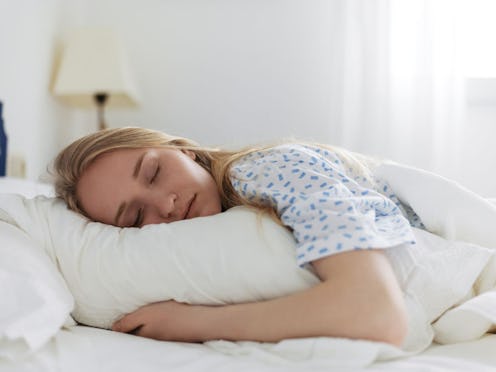Life
Does Diet Affect Sleep? A New Study Links Inflammatory Diets With Body Clock Disorders

Most of us are aware of a few basic rules concerning diet and sleep. No caffeine in the evenings, for example. No cheese before bed (fine, that one's been debunked.) But how else does diet affect sleep? According to a new study, the connection between the two could run deeper than a sneaky midnight Babybel or two. Researchers from Northwestern University in the U.S. found that inflammation — which can be catalysed by diet — impacts the body clock, potentially leading to sleep disorders.
In the study, published in Genes & Development, researchers investigated the impacts of inflammation in genetically modified mice. They used a newly developed "genetic switch" to activate and deactivate inflammation in the mice, monitoring the impacts on the mice's circadian rhythm (or body clock). When inflammation was deactivated, the mice's circadian rhythms were disrupted, meaning they no longer had a sense of the time and couldn't maintain a cycle of rest and activity. (What a thoroughly heartbreaking image.)
The researchers determined that both inflammation and the body clock are influenced by the same genetic factor, called NF-kappa beta (NFKB). By triggering a series of chain reactions within the body, NFKB causes the pain and tissue damage associated with inflammatory diseases — like arthritis, for example. According to the researchers, NFKB also influences the body clock.
Their conclusion? Inflammation, potentially including that caused by diet, could lead to circadian rhythm disorders, a type of sleep disorder involving a disrupted sleep pattern that's out of sync with typical waking/sleeping times. It’s important to note that the researchers don’t claim their study has demonstrated their theorised link between diet and circadian disorders, but rather that it provides a “roadmap” for future research into the connection.
The researchers also posited that a disrupted circadian rhythm could connect diet and disease, in the case of illnesses like diabetes, certain cancers, and heart disease which are often associated with inflammatory diets. "We don't know the reasons, but this interaction between the inflammation and clocks is not only relevant to understanding how inflammation affects the brain and sleep-wake cycle but also how immune or fat cells work," said Hee-Kyung Hong, one of the study's authors and an assistant professor of endocrinology at Northwestern University.
As for what we do know about foods that can aid sleep, there are dietary tweaks you can make that might help, according to the Guardian. Potassium-rich foods like bananas can help to relax the muscles, while turkey, chicken, lentils, tofu, tuna, eggs, and yes, even cheese are high in tryptophan and vitamin B6, which boost the production of the sleep hormone melatonin. Consuming fibre — from whole grains, beans, berries, lentils, and other sources — can also result in better quality sleep, studies suggest.